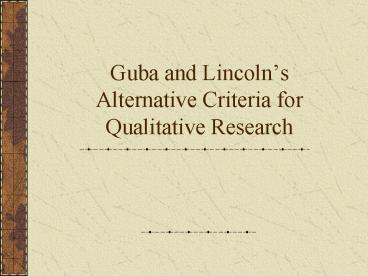Guba and Lincolns Alternative Criteria for Qualitative Research - PowerPoint PPT Presentation
1 / 16
Title:
Guba and Lincolns Alternative Criteria for Qualitative Research
Description:
Guba and Lincoln's Alternative Criteria for Qualitative Research ... Lincoln, Y. S., & Guba, E. G. (1985). Naturalistic inquiry. ... – PowerPoint PPT presentation
Number of Views:1121
Avg rating:3.0/5.0
Title: Guba and Lincolns Alternative Criteria for Qualitative Research
1
Guba and Lincolns Alternative Criteria for
Qualitative Research
2
Quantitative (Positivist) Criteria
- Validity does the study measure what it claims
to measure? - Construct what do the scores mean or signify?
- Content how well do the questions represent the
whole set of possible questions? - Criterion how well do the scores relate to an
outcome or predict a future outcome? - Reliability if I measure the same thing again,
will I get the same result?
3
Internal and External Validity
- External validity how well the findings of a
study (using a sample) can be generalized to the
population as a whole - Internal validity the extent to which
confounding variables have been reduced or
eliminated
4
Egon Guba and Yvonna Lincoln
- Guba, E.G. Lincoln, Y.S. (1989). Fourth
generation evaluation. Thousand Oaks, CA Sage. - Lincoln, Y. S., Guba, E. G. (1985).
Naturalistic inquiry. Beverly Hills, CA Sage
Publications, Inc.
5
Qualitative (Postpositivist) Criteria
- Numerous sets, but Guba and Lincolns parallel
criteria are very influential - Trustworthiness
- Credibility parallels internal validity
- Transferability parallels external validity
- Dependability parallels reliability
- Confirmability parallels objectivity
6
Credibility
- Do the research results and reports represent the
lives and realities of the research participants
in ways that the participants recognize? - Will participants say yes, thats how it was if
they read the reports? - Have I searched for disconfirming evidence?
7
Credibility Strategies
- Prolonged engagement
- Persistent observation
- Triangulation
- Peer debriefing
- Negative case analysis
- Referential adequacy
- Member checks
8
Transferability
- Can the results of the research be used in
contexts other than those in which the research
was done? - Is the research useful to people in other places?
9
Dependability
- If similar research were done again in the same
context, or in a similar context, is it probable
that the findings would be similar? - Can readers rely on these findings to shed light
on similar contexts at other times and places?
10
Confirmability
- To what extent would other researchers doing the
same research have similar findings? - In other words to what extent does the study
reflect the actual situation, rather than just my
own perspective?
11
Qualitative (Postpositivist)
- Authenticity
- fairness
- educative authenticity
- ontological authenticity
- catalytic authenticity
- tactical authenticity
12
Fairness
- deals with the extent to which alternative
constructions of the research process and
results, arising from the participants in the
educational situation rather than from the
researchers, are an explicit part of the
reporting of the research
13
Educative authenticity
- represents the extent to which individual
respondents understanding of and appreciation
for the constructions of others outside their
stakeholding group are enhanced
14
Ontological authenticity
- relates to respondents ability to know and
understand their own situation more deeply
15
Catalytic authenticity
- relates to respondents ability to be stimulated
to act in order to improve their situation - Relates to Patti Lathers catalytic validity
the extent to which the research project actually
supports practitioners in changing and improving
their practice
16
Tactical authenticity
- relates to respondents ability to be empowered
to act































